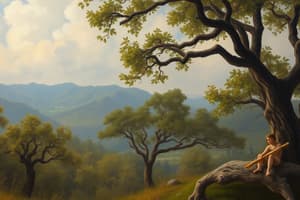Podcast
Questions and Answers
Who was chosen as the Democratic National Convention leader who had views on Popular Sovereignty?
Who was chosen as the Democratic National Convention leader who had views on Popular Sovereignty?
- General Lewis Cass (correct)
- Henry Clay
- Zachary Taylor
- Daniel Webster
What is Popular Sovereignty?
What is Popular Sovereignty?
The concept that a state's people should vote whether to be a slave state or free.
Who was a military leader in the Mexican-American War and the 12th president of the United States?
Who was a military leader in the Mexican-American War and the 12th president of the United States?
- Zachary Taylor (correct)
- Martin Van Buren
- Franklin Pierce
- William H. Seward
What did the Free Soil Party oppose?
What did the Free Soil Party oppose?
Who won the Election of 1848?
Who won the Election of 1848?
What began on January 24, 1848, in California?
What began on January 24, 1848, in California?
The California Constitution adopted in 1849 prohibited slavery.
The California Constitution adopted in 1849 prohibited slavery.
Who was known as a renowned conductor on the Underground Railroad?
Who was known as a renowned conductor on the Underground Railroad?
Who outlined the Compromise of 1850?
Who outlined the Compromise of 1850?
What was the Fugitive Slave Law of 1850 designed to do?
What was the Fugitive Slave Law of 1850 designed to do?
Which candidate won the Election of 1852?
Which candidate won the Election of 1852?
What was the Clayton-Bulwer Treaty about?
What was the Clayton-Bulwer Treaty about?
What did the Gadsden Purchase accomplish?
What did the Gadsden Purchase accomplish?
Which act created two new territories, allowing popular sovereignty to determine the status of slavery?
Which act created two new territories, allowing popular sovereignty to determine the status of slavery?
What did the Mason-Dixon line originally divide?
What did the Mason-Dixon line originally divide?
Flashcards are hidden until you start studying
Study Notes
General Lewis Cass
- Veteran of the War of 1812 chosen by the Democratic National Convention in 1848.
- Advocated for Popular Sovereignty regarding slavery's extension into new territories.
Popular Sovereignty
- Principle allowing residents of a territory to vote on whether to permit slavery.
Zachary Taylor
- Military leader in the Mexican-American War, became the 12th president of the U.S.
- Whig party member, died in office in 1850; succeeded by Millard Fillmore.
Free Soil Party
- Formed between 1847-1848, opposing slavery in new territories like Oregon.
- Promoted federal aid for internal improvements and free land for settlers.
Election of 1848
- Featured candidates: Zachary Taylor (Whig, winner), Martin Van Buren (Free Soil Party), and Lewis Cass (Democrat).
- Resulted in Taylor's presidency and eventual succession by Fillmore after Taylor's death.
Gold Rush of 1848
- Began on January 24, 1848, with gold discovered by James W. Marshall in California.
- Attracted approximately 300,000 people, half arriving by sea and half overland.
California Constitution
- Urged by Taylor in 1849, this constitution prohibited slavery within California.
Harriet Tubman
- Renowned American abolitionist who escaped slavery and led over 300 slaves to freedom via the Underground Railroad.
Southern Grievances before 1850
- Concerns included potential imbalance of slave-free states with California's admission and issues over the return of runaway slaves.
Henry Clay
- Kentucky senator and strong advocate of the American System and known as "The Great Compromiser."
- Proposed the Compromise of 1850, outlining five main points.
John C. Calhoun
- Led the Fugitive Slave Law enforcement and defended slavery's necessity in society.
- Argued for an upper ruling class exploiting a lower working class.
Daniel Webster
- Prominent Whig Party leader; originally pro-North, he supported the Compromise of 1850 to maintain unity.
Seventh of March Speech
- Webster's last important speech, advocating for support of the Compromise of 1850 to ease sectional tensions.
William H. Seward
- Whig senator opposing the expansion of slavery, known for his "higher law" doctrine and "irrepressible conflict" view.
Millard Fillmore
- Ascended to presidency after Taylor's death; instrumental in advancing the Compromise of 1850 among Northern Whigs.
Nashville Assembly
- Meeting of Southern extremists in 1850, strongly opposing compromise measures and advocating for slavery.
Fugitive Slave Law of 1850
- Legislation requiring federal commissioners to enforce the return of escaped slaves, compelling citizens' cooperation.
Personal Liberty Laws
- Enacted by Northern states to counteract Fugitive Slave Acts, protecting escaped slaves with jury trial rights.
Franklin Pierce
- Democratic candidate in 1852, known for the Gadsden Purchase and controversial Kansas-Nebraska Act.
Winfield Scott
- U.S. Army general and presidential candidate; known for his long service and proposed Anaconda Plan during the Civil War.
Election of 1852
- Pitted Franklin Pierce against Winfield Scott; the Whig Party split, supporting Pierce led to a rise of sectional parties.
Mosquito Coast
- Area in Central America where British interests clashed with U.S. goals, leading to a treaty for American transit rights.
Clayton-Bulwer Treaty
- 1850 agreement between the U.S. and Great Britain preventing either from obtaining exclusive canal rights in Panama.
William Walker
- Self-declared president of Nicaragua; known for legalizing slavery but was eventually overthrown and killed.
Ostend Manifesto
- 1854 declaration advocating U.S. seize of Cuba if Spain refused to sell it, offering $120 million for the territory.
Opium War
- Conflict between Britain and China (1839-1842) over the opium trade, resulting in Britain's control of Hong Kong.
The Black Warrior Incident
- An American steamer seized by Spanish officials in 1854, leading to tensions with European powers over ongoing conflicts.
Caleb Cushing
- American diplomat negotiated the Treaty of Wanghia, the first formal agreement between the U.S. and China in 1844.
Treaty of Wanghia
- Signed July 3, 1844, marked a significant trade agreement, granting the U.S. extensive trading rights in China.
Tokugawa Shogunate
- Japanese shogunate with a rigid four-class system and isolationist policies; fostered domestic trade and cultural developments.
Matthew C. Perry
- Naval officer whose 1853 mission resulted in the 1854 Treaty of Kanagawa, opening Japan to American trade.
Treaty of Kanagawa
- 1854 agreement granting access to two Japanese ports for U.S. ships and establishing a U.S. embassy in Japan.
Jefferson Davis
- President of the Confederate States of America from 1861 to 1865, overseeing the Confederacy's Civil War efforts.
James Gadsden
- Negotiator of the Gadsden Purchase, acquiring land from Mexico for a transcontinental railroad route for $10 million.
Gadsden Purchase
- The acquisition of land from Mexico, finalized in 1853, essential for constructing the southern transcontinental railroad.
Stephen A. Douglas
- Illinois politician known for his role in the Kansas-Nebraska Act, endorsing popular sovereignty amidst slavery tensions.
Kansas-Nebraska Bill
- 1854 legislation creating the Kansas and Nebraska territories, allowing settlers to determine slavery status through voting.
Missouri Compromise
- 1820 agreement permitting Missouri as a slave state, Maine as a free state, and restricting slavery north of latitude 36°30'.
New Republican Party
- Emerged in the Midwest as a coalition of discontented political groups opposing the Kansas-Nebraska Act.
Mason-Dixon Line
- Traditional boundary separating free and slave states, originally established between Pennsylvania and Maryland in the 1760s.
Studying That Suits You
Use AI to generate personalized quizzes and flashcards to suit your learning preferences.




